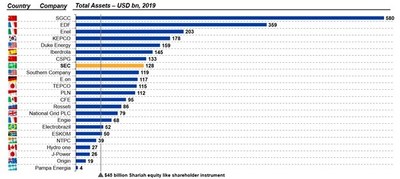
Saudi Arabia's Electricity Sector Undergoes Largest, Most Comprehensive Transformation On A Global Scale
A press conference was held on Monday 16th November 2020, organized by Saudi Arabia's Ministry of Energy, to announce sweeping electricity sector reforms that will ensure the long-term health and sustainability of the electricity sector and the achievements of the Kingdom's goal under Vision 2030.
These reforms are considered a crucial steppingstone in achieving the Ministry of Energy goals for the electricity sector which are in line with the goals of Vision 2030, and include the following:
- Transition to the optimal energy mix for electricity production in the Kingdom, with shift to renewable energy and efficient natural gas sources; and
- Increase system efficiency and the reduced use of liquid fuels for energy production; and
- Increase the sector's Transmission and Distribution network security and reliability to enable effective integration of renewable energy and interconnection with neighboring countries; and
- Greater environmental compliance to reduce the sector's carbon footprint
The comprehensive reform package of measures includes the establishment of a revenue requirement mechanism for sector service providers and a tariff balancing account to compensate for the difference between the efficient cost to serve and the income from tariffs.
His Royal Highness Prince Abdulaziz bin Salman bin Abdulaziz Al Saud, Minister of Energy, Saudi Arabia, said:
"This announcement is a major achievement for Saudi Vision 2030 and for the Ministry of Energy's ambitious goals for creating a sustainable, reliable, and diverse power sector. The reforms are considered the largest and most extensive on a global scale. These reforms lay critical foundations by helping to create a more solid and financially viable sector attracting the required investments. The expected outcomes of this sweeping reform program include more efficient power generation, reduction in the use of liquid fuels for electricity generation and increased environmental protection.
"Moreover, the reforms aim to increase the reliability and quality of service of the Kingdom's electricity transmission network and to facilitate the production of electricity from renewable energy sources, bringing it in line with the Kingdom's optimal energy mix for electricity production."
His Excellency Dr. Khaled bin Saleh Al Sultan, Chairman of Saudi Electricity Co., said:
"With this historic comprehensive reform program, SEC's balance sheet will become more robust enhancing SEC's ability to fund projects and enabling it to execute on its strategy to contribute to the development of a stronger, more sustainable, and diverse electricity sector."
For Saudi Electricity Co. specifically the reforms mark the entry of the Company into a regulatory framework with clear rights and obligations. In return the Company will have the right to receive a fair rate of return of 6% (WACC) on its regulated asset base and fully recover its efficient cost-to-serve as determined by the regulator, Electricity and Cogeneration Regulatory Authority (ECRA). Importantly the Company will operate under a predictable, transparent, and stable regulatory framework with clear arm's length commercial relations amongst sector players and participants. The reforms also include the cancellation of government fees the Company had been paying and the reconciliation of the Company's net legacy Government liabilities, and the restructuring of its balance sheet.
HSBC, financial advisor to Saudi Electricity Co., commented:
"The creation of this financial instrument and the introduction of an international standard regulatory framework should enable Saudi Electricity Co. to maintain a more sustainable capital structure. Through the Balancing Account, the Government is expected to continue supporting the sector and Saudi Electricity Co. on a more structured and transparent basis.
"These reforms will help improve the sector's efficiency while providing a fair rate of return on invested capital. Furthermore, the restructuring also supports a key policy objective of a safe, secure and reliable power sector that is financially sustainable and able to invest in projects that could enhance consumer service and improve reliability. Overall, these announcements are expected to create an attractive environment for investment in the electricity sector and contribute to the economic development of Saudi Arabia, in line with the Vision 2030 program."
The magnitude of the reform is a momentous landmark on multiple fronts, it is the:
- Largest Islamic financial transaction to be executed globally with issuance of a $45 billion Mudaraba instrument (interest of 4.5%) by Saudi Electricity Co. and the single largest conversion to a non-dilutive equity-like instrument from debt.
- SEC will have the largest regulated asset base of any utility in the MENA region and will have a regulated asset base which in comparable to the largest utility companies in G20 countries.
- The immediate deleveraging of the USD 128 billion balance sheet of Saudi Electricity Co. from a debt-to-equity-ratio of 2.2 to a ratio of 0.6, in line with what is generally considered to be healthy debt levels for a utility company of its scale.
Strategy&, a global strategy consulting business and part of the PwC network, and advisors to the Ministry of Energy for the restructuring of the electricity sector, added:
"This demonstrates how the reforms hit the reset button on the legacy of decades of ad-hoc methods of addressing the financial challenges of the electricity sector, and put in place a robust, transparent, and stable regulatory framework that will ensure the financial sustainability and health of Saudi Electricity Co. and their ability to meet all their commercial obligations including fuel payment, debt service, and dividends. It also provides Saudi Electricity Co., the 8th largest utility globally by asset size, the financial strength to raise the funds necessary to invest in strengthening the electricity grid, enhancing the network security and reliability.
"The power system in the Kingdom could not achieve its ambitions without a fundamental redefinition of the sector's financial foundation and operating model. At this important juncture, however, the expectations from the Saudi Arabian power sector are much higher than ever before. The reforms have created important instruments for achieving the policymaker's objectives for modernizing and transforming the utility sector as part of the Kingdom's Vision 2030."



























